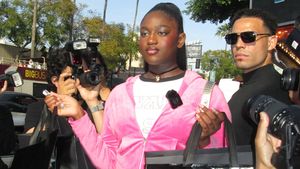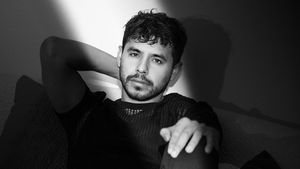It was announced on Thursday that Iraqi War vet and out lesbian, Liz Carmouche, 28, will become the first openly gay fighter to join the Ultimate Fighting Championship (UFC) circuit, with the first ever female fight, between Carmouche and Ronda Rousey, set for February 23rd, according to the Huffington Post.
The UFC is the largest mixed martial arts (MMA) competition in the world, where fighters enter the cage and engage in various styles of hand-to-hand combat.
The sport, known for its tainted history of homophobia and anti-gay sentiment, is making strides to try and right the ship. Back in 2009 UFC president Dana White caused controversy when he used a slur during a rant on his personal blog. Since then White has apologized for the incident and Zuffa (UFC’s parent company) made a sizable donation towards the construction of a gay and lesbian center in Las Vegas.
"The Girl-Rilla," Carmouche’s nickname on the mats, and other fans of the sport, are hoping that the MMA continues its present course towards equality. "I thought I'd come into contact with some stereotypical person who's anti-homosexuality, whether it be men or women. But I found the opposite. All they care about is a good, quality person who's a good training partner. Apart from that, what you do with your personal life, they really don't care," she told MMAFighting.
Sadly, the Marine, who rose to the rank of Sergeant and completed her service in 2009, is no stranger to the world of homophobia. She was plagued by slurs and derogatory comments on a regular basis during her three tours in Iraq. She served during the "Don't Ask, Don't Tell" (DADT) era as a closeted lesbian and recently told Sports Illustrated, "There was nothing positive in terms of anything homosexual, anyone they suspected of being gay, they automatically treated as a scapegoat."
However, Carmouche has heard that change has come to the military since the repeal of DADT. "I've heard of couples being on base," Carmouche told Sports Illustrated. "More so in the Navy and the Army. They'll actually go to the grocery store and hold hands. On base that was something you would never do. It wasn't safe to go out with your significant other, much less hold hands with them. I see pictures and news stories of people coming back from Iraq and Afghanistan and being able to embrace their significant other. It's definitely changed a lot."
At the end of the day, the athlete, who can be credited with changing minds within the world of the MMA and the military, is proud of the personal progress she’s made. "There's no amount of money that's going to make me go back in the closet," she said.
Follow SheWired on Facebook.
Follow SheWired on Twitter.































































































































